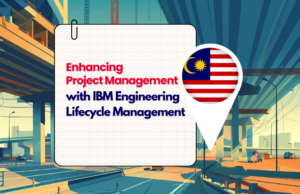Malaysia’s construction sector is set for substantial growth in 2024, thanks to a wave of major infrastructure projects. These projects, ranging from transit systems to flood mitigation measures, are part of a larger strategy to boost the nation’s infrastructure and stimulate economic growth. This year’s record-breaking budget has paved the way for developments including the Penang Light Rail Transit, the reinstatement of the LRT3, and the Pan Borneo Sabah Phase 1B, which collectively contribute to a development expenditure of RM90 billion (The Star). This positive trajectory is expected to drive contract awards beyond current levels, creating significant opportunities for the construction industry and beyond.
As these projects unfold, they highlight the need for robust project management solutions that can handle the sector’s complexities. IBM Engineering Lifecycle Management (ELM) offers a comprehensive platform designed to streamline workflows, ensuring all aspects of project management are covered, from planning to execution.

In this article, we explore how IBM ELM can play a pivotal role in managing these large-scale projects, ensuring efficiency, compliance, and collaboration across diverse teams. This overview will delve into the specific benefits IBM ELM brings to Malaysian infrastructure projects, highlighting its potential to transform the construction sector in 2024 and beyond.
Challenges in Managing Infrastructure Projects
Managing Malaysian infrastructure projects poses significant challenges, particularly as these projects scale up in size and complexity. Here are some key challenges:
- Coordination Across Multiple Stakeholders: Infrastructure projects often involve a complex web of stakeholders including government entities, private contractors, and international partners. Coordination and collaboration across these entities are crucial to ensure seamless execution, yet managing this level of interaction can be difficult, leading to potential bottlenecks and delays.
- Compliance and Regulatory Adherence: Infrastructure projects must adhere to a variety of local, national, and international regulations. For example, projects such as the Penang LRT and MRT3 require adherence to rigorous safety standards, environmental regulations, and other legal frameworks. Failure to comply can lead to costly delays or even project cancellations.
- Managing Costs and Resources: Rising material costs and logistics expenses pose another challenge for infrastructure projects. Malaysia has seen increases in the prices of key materials such as sand and concrete, leading to heightened project costs. Additionally, ensuring adequate skilled labor and managing construction materials effectively are essential to maintaining project timelines and budgets.
- Technical Complexity and Innovation: As infrastructure projects incorporate increasingly advanced technologies, they face technical complexities that necessitate sophisticated project management. The integration of various engineering disciplines, including mechanical, electrical, and software engineering, demands seamless collaboration and alignment to ensure project success.
- Time Constraints: The Malaysian government’s focus on rolling out projects efficiently places time constraints on infrastructure developments. Managing these projects swiftly while maintaining quality requires tools that can automate and streamline workflows across teams and disciplines.

Considering these challenges, it becomes clear that robust project management solutions, such as IBM ELM, are essential to address these complexities and ensure the successful completion of Malaysian infrastructure projects.
IBM ELM’s Role in Streamlining Project Management
IBM Engineering Lifecycle Management (ELM) plays a pivotal role in streamlining the management of infrastructure projects by providing a comprehensive, integrated platform that encompasses all facets of project execution:

Unified Project Management: IBM ELM offers a single platform to manage the entire project lifecycle from requirements gathering to design, testing, and delivery. This unification is particularly valuable in managing complex infrastructure projects, where various disciplines such as mechanical, electrical, and software engineering must work in tandem.
Seamless Collaboration: IBM ELM‘s collaborative features enable teams to work together efficiently across geographical distances and disciplines. This is crucial in Malaysian infrastructure projects where multiple stakeholders, including local and international contractors, must coordinate effectively to avoid delays and ensure project success.


Automation of Workflows: IBM ELM‘s automation capabilities streamline project workflows by automatically generating reports, managing documents, and integrating data across different engineering tools. This automation helps reduce manual intervention, minimizing errors and allowing project teams to focus on more strategic aspects of project execution.
Risk Management and Compliance: IBM ELM‘s risk management features support infrastructure projects by identifying potential issues early and allowing for effective mitigation measures. Moreover, its compliance capabilities ensure that projects adhere to safety, environmental, and regulatory standards, preventing costly delays or legal repercussions.

In summary, IBM ELM‘s comprehensive suite of tools offers a powerful solution to the challenges faced in managing Malaysian infrastructure projects, ensuring efficient execution, compliance, and collaboration across teams and disciplines
The Solution
The Malaysian infrastructure sector is poised for a transformative year, with a wide range of ambitious projects on the horizon. As these projects roll out, managing the complexities of cross-disciplinary collaboration, regulatory compliance, and timely execution becomes paramount. IBM Engineering Lifecycle Management (ELM) provides a comprehensive solution to these challenges, streamlining workflows, enhancing traceability, and supporting effective risk management.
We invite stakeholders and project managers in the Malaysian infrastructure sector to explore how IBM ELM can integrate seamlessly into their project management practices. By doing so, they can ensure their projects are completed efficiently, on time, and in full compliance with regulatory standards. Contact Custommedia to learn more about implementing IBM ELM solutions in your projects, and unlock the potential for growth, efficiency, and success in Malaysia’s infrastructure landscape.

